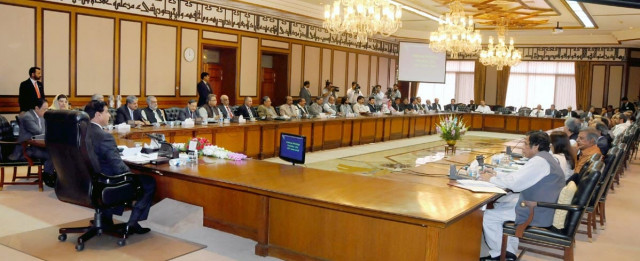Maiden cabinet session: Action, not words, to tackle power crisis, says PM
Vows to reduce power outages in Ramazan; ministers brief premier on strategy to increase power generation.

Prime Minister Raja Pervaiz Ashraf’s journey from minister for water and power to prime minister has, it seems, seen him realise at least one thing: keep promises realistic.
And so it was when the premier chaired his first cabinet meeting on Tuesday – with the top item on the agenda being the prevailing power crisis. The prime minister promised that there would be no load-shedding at the time the public would be keeping and opening their fasts in the upcoming month of Ramazan. That’s a sea change from his time as minister for water and power in the Gilani cabinet, when he had famously announced, on more than one occasion, that all load-shedding would be ended completely by 2009.
Vowing to address the energy shortage, the premier said, “Energy is a national issue and the government will not leave any stone unturned to address this issue.” Most poignantly, he added: “I promise that I’ll speak through actions and not words.”
After receiving a detailed briefing from the water and power as well as petroleum secretaries, the prime minister directed the cabinet’s energy committee, headed by the finance minister, to strategise how to cut down line losses and theft of electricity – both of which cause huge losses to the power sector.
Premier Ashraf also instructed the ministry of water and power to recover the arrears of the Water and Power Development Authority (Wapda) from private sector entities as well as federal and provincial governments to avoid circular debt in the future. He further directed the finance ministry to deduct the arrears from government departments if they have been identified as defaulters.
Briefing
Earlier, the water and power secretary, while briefing the cabinet, said that 12,410 Megawatts (MW) of electricity is being generated at the moment, while there is a shortage of 5,733 MW.
Over the last three days, 460 MW has been added to the national grid, and, by Tuesday evening, another 300 MW will be added to the national grid, the secretary said. In total, including this addition, 2,100 MW will be added by June 28, and, in July, due to an increase in power generation, substantial relief will be provided to the people, the secretary further claimed. Much of this increase in power generation has to do with hopes that the upcoming monsoon season and melting glaciers will increase the flow in rivers.
Meanwhile, the petroleum minister informed Prime Minister Ashraf that his ministry has issued instructions to immediately release 28,000 tonnes of oil for power plants.
The premier then directed the railways ministry to make special arrangements for transporting the oil as soon as possible to expedite power generation. The railways minister informed the cabinet that three special trains have been arranged in this regard.
In response to media reports that 600MW of electricity would be cut from the Karachi Electricity Supply Corporation’s (KESC’s) supply, Information Minister Qamar Zaman Kaira clarified that this was a misunderstanding. He said that “An equal amount of electricity will be available to KESC by making its gas-fired plants operational, which is the company’s preferred option. So the question of cutting the electricity supply to KESC is simply misplaced and a mere conjecture.”
Later, the finance division secretary gave a presentation on the Consumer Price Index (CPI). He informed the cabinet that the CPI had reduced from 13.7% last year to 11% this year.
Later a presentation was given to the cabinet by secretary, finance division, on the Consumer Price Index in the country, which indicates the trend of prices of essential commodities. The Cabinet was told that the CPI has come down from 13.7% last year to 11% this year. Food inflation has also shown signs of retreating, it was claimed. The Sensitive Price Indicator (SPI) decreased from 16.9% last year to 6.8% this year. The wholesale price index came down from 21% last year to 16.8 % this year, the presentation claimed.
The cabinet later accorded its approval to sign agreements over the Border Ports and Management System and Boundary Management System between the governments of China and Pakistan.
Published in The Express Tribune, June 27th, 2012.



















COMMENTS
Comments are moderated and generally will be posted if they are on-topic and not abusive.
For more information, please see our Comments FAQ